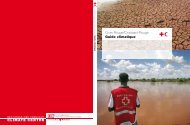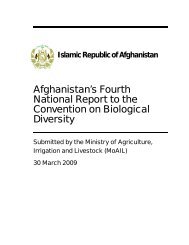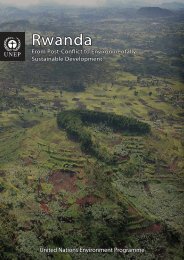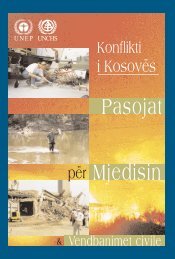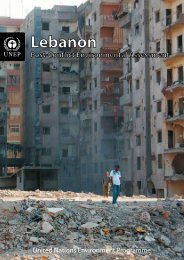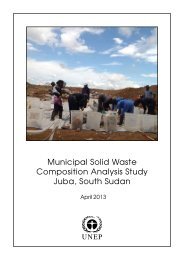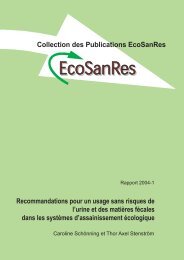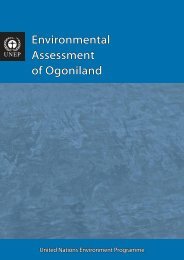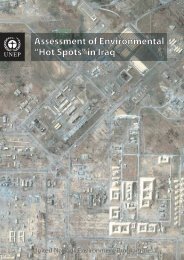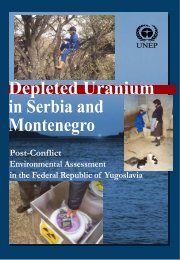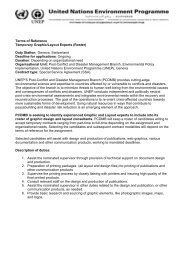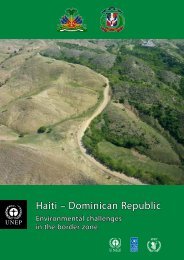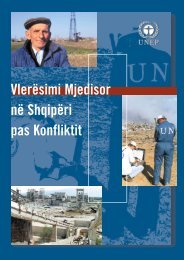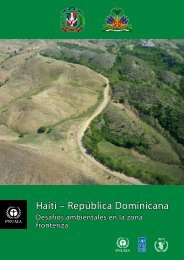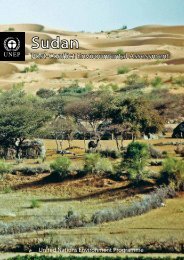Strengthening capacity - Disasters and Conflicts - UNEP
Strengthening capacity - Disasters and Conflicts - UNEP
Strengthening capacity - Disasters and Conflicts - UNEP
You also want an ePaper? Increase the reach of your titles
YUMPU automatically turns print PDFs into web optimized ePapers that Google loves.
3 CAPACITY<br />
BUILDING GOALS<br />
Many societies, both conflict-prone <strong>and</strong> postconflict,<br />
would benefit from developing a NRM<br />
system that is designed to:<br />
Contribute to economic development;<br />
Foster sustainable use of l<strong>and</strong> <strong>and</strong> renewable<br />
resources while minimizing <strong>and</strong> compensating<br />
for the negative environmental <strong>and</strong> social<br />
impacts of extractive activities; <strong>and</strong>,<br />
Address resource-based conflicts peacefully.<br />
On one level, a <strong>capacity</strong>-building programme is<br />
successful if it: enables a country to foster conditions<br />
that attract Foreign Direct Investment (FDI) to<br />
resource-based economic activities; enhances<br />
employment generation; increases budget revenues;<br />
<strong>and</strong> strengthens state-society relations. However, the<br />
overwhelming majority of livelihoods in conflictaffected<br />
states are dependent on access to l<strong>and</strong> <strong>and</strong><br />
renewable natural resources such as forests <strong>and</strong><br />
water. Therefore, economic development goals<br />
will not be met while practices revolving around<br />
unsustainable resource use remains. Similarly,<br />
Extractive Industries – which often provide relatively<br />
few locally based jobs – may impose heavy <strong>and</strong><br />
uncompensated burdens on the l<strong>and</strong>, water, forests,<br />
<strong>and</strong> other resources that traditionally underpin most<br />
livelihoods in other sectors of the economy.<br />
In addition to providing economic benefits <strong>and</strong><br />
environmental wellbeing, NRM systems in conflictaffected<br />
or fragile states must also counteract the<br />
very salient risk of violence. Natural resources are<br />
valuable livelihood assets imbued with deep cultural,<br />
religious, <strong>and</strong> social meaning. For these reasons,<br />
they are also recurrent sites for contestations of<br />
power. Technical institutions <strong>and</strong> practices cannot be<br />
imposed unilaterally; they must be negotiated into<br />
existence with the support of many stakeholders.<br />
This is particularly true where <strong>capacity</strong> to manage<br />
natural resources starts from an extremely weak<br />
base. The risk of violence is reduced if powerful<br />
stakeholders, for whom violence is an available<br />
option, view it as in their interests to take a nonviolent<br />
approach, <strong>and</strong> are empowered to identify<br />
existing <strong>and</strong> potential conflicts between themselves<br />
<strong>and</strong> participate meaningfully in a governance system<br />
that provides peaceful remedies.<br />
Therefore, the goals of EU <strong>and</strong> UN in the context of<br />
<strong>capacity</strong>-building for NRM in conflict-affected <strong>and</strong><br />
post-conflict contexts should be:<br />
To help governments enable <strong>and</strong> mediate between<br />
different stakeholders (rather than trying to<br />
control them); <strong>and</strong>,<br />
To help civil society participate in the resource<br />
management process at local <strong>and</strong> national levels.<br />
A government that seeks buy in from conflicting<br />
groups must develop credibility <strong>and</strong> trust by<br />
listening to their priorities <strong>and</strong> supporting their<br />
decisions, delivering visible improvements, <strong>and</strong><br />
providing relevant education <strong>and</strong> tools. In turn,<br />
non-governmental stakeholders must be able to<br />
voice their concerns, respond to government action,<br />
<strong>and</strong> engage in the NRM process on a sustained<br />
basis. Building a society’s <strong>capacity</strong> to manage<br />
natural resources in this way helps it develop its own<br />
conflict prevention mechanisms while meeting its<br />
environmental <strong>and</strong> economic goals.<br />
STRENGTHENING CAPACITY FOR CONFLICT-<br />
SENSITIVE NATURAL RESOURCE MANAGEMENT 13



